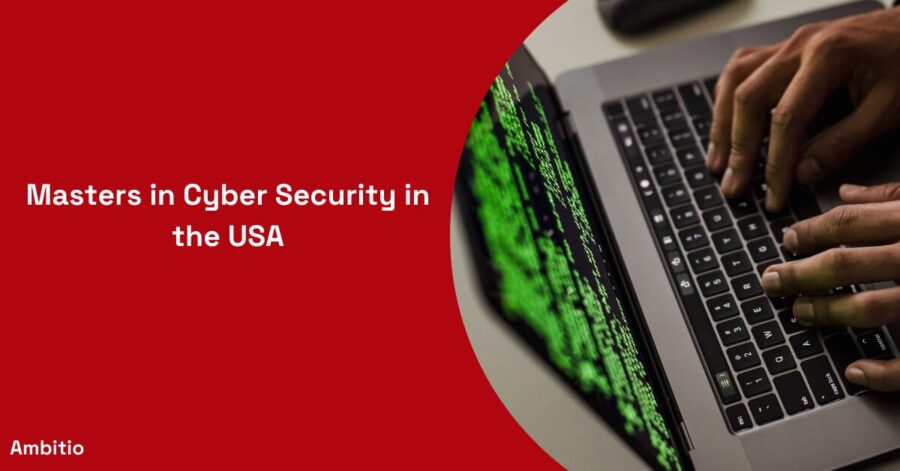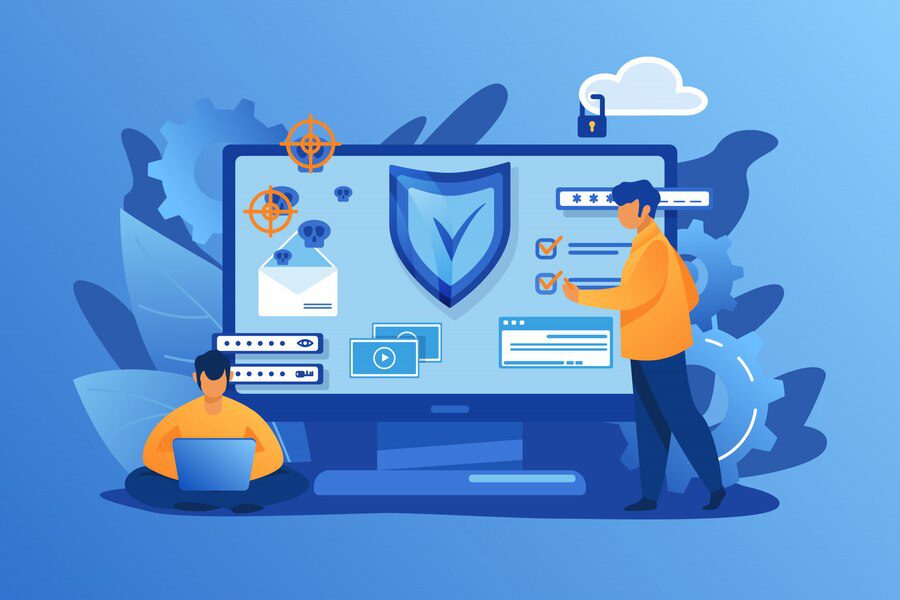17 December 2024
6 minutes read
Masters in Cyber Security in the USA

KEY TAKEAWAYS:
- Prioritize programs with cutting-edge cybersecurity labs and research.
- Seek internships for real-world security challenges.
- Engage in cybersecurity communities and conferences.
The field of cyber security has become increasingly pivotal in our digital era. A Master of Science in Cyber Security in the USA offers a comprehensive understanding of information security, network security, and system security. It prepares students to tackle national and enterprise security challenges.
With the evolution of cyber threats, these cybersecurity programs provide the necessary skills to protect information infrastructure and ensure national security.
Programs typically cover aspects of cyber defense, cyber forensics, and cybersecurity risk. They also delve into the legal and ethical issues surrounding information assurance.
This makes a master’s degree in cybersecurity not just a study of technical aspects, but also a deep dive into the broader context of security in the modern world.
Top Universities for Masters in Cyber Security in the USA

| University Name | Location | Program Highlights | Unique Features |
|---|---|---|---|
| University of California | Berkeley, CA | Advanced Network Security, Cybersecurity Policy | Industry partnerships, Renowned research facilities |
| MIT | Cambridge, MA | Cybersecurity Engineering, Information Assurance | Cutting-edge cybersecurity lab, Expert faculty |
| Stanford University | Stanford, CA | Cyber Defense, Cyber Forensics | Interdisciplinary approach, State-of-the-art resources |
| Carnegie Mellon University | Pittsburgh, PA | Information System Security, Security Engineering | Pioneering research in cybersecurity, Strong industry ties |
| Georgia Institute of Technology | Atlanta, GA | Information Security, System Security | Innovative teaching methods, Extensive alumni network |
Course Details and Curriculum
| Course Category | Course Examples | Description |
|---|---|---|
| Core Courses | Advanced Network Security | Focused on securing complex networks and protecting data in transit. |
| Cybersecurity Policy and Governance | Covers the legal, ethical, and policy frameworks governing cybersecurity. | |
| Cyber Threats and Attack Techniques | Teaches about various cyber threats and the methods used in cyber attacks. | |
| Technical Electives | Cryptography and Secure Communication | Explores cryptographic techniques and secure communication protocols. |
| Cybersecurity Engineering | Focuses on designing and implementing secure systems. | |
| Intrusion Detection and Hacker Exploits | Provides knowledge on identifying and defending against hacking techniques. | |
| Managerial Electives | Cybersecurity Risk Management | Focuses on assessing, managing, and mitigating cybersecurity risks. |
| Information Security Leadership and Management | Prepares students for leadership roles in cybersecurity. | |
| Cybersecurity Law and Ethics | Offers insight into legal and ethical aspects of cybersecurity. | |
| Practical Components | Cybersecurity Capstone Project | A culminating project where students apply their learning to real-world scenarios. |
| Cybersecurity Internships | Hands-on experience in a professional cybersecurity setting. | |
| Cybersecurity Labs and Workshops | Practical exercises in controlled environments to test and refine cybersecurity skills. |
Admission Process for Masters in Cyber Security
- Academic Background Check
- A bachelor’s degree in fields like Computer Science, Information Technology, or a related discipline is usually required.
- A strong academic record, often with a minimum GPA requirement set by the university.
- Technical Skill Assessment
- Proficiency in programming languages (e.g., Python, Java) is often essential.
- Fundamental understanding of network and system security.
- Standardized Test Scores
- GRE scores might be required, depending on the university’s policy.
- For international students, English language proficiency tests like TOEFL or IELTS are mandatory.
- Submission of Application Documents
- Completed application form specific to the university.
- Statement of Purpose (SOP) outlining the applicant’s objectives and motivations for pursuing the degree.
- Letters of Recommendation (typically two or three) from academic or professional references.
- Visa Process for International Students
- Securing an F-1 student visa, which includes providing proof of financial support and ties to the home country.
- Completing the SEVIS I-901 form and paying the associated fee.
- Interviews and Additional Requirements
- Some programs may require interviews (either in-person or virtual).
- Additional requirements, such as a portfolio of work or relevant professional experience, may be necessary for certain specialized programs.
- Application Deadlines and Timeline
- Adhering to specific application deadlines, which may vary depending on the university and program.
- Preparing for potential waitlist scenarios or late admissions processes.
Cost and Financial Aspects of Studying in the USA
Studying for a Master’s in Cyber Security in the USA involves various costs:
- Tuition Fees: Generally range from $20,000 to $60,000 per year, varying across universities.
- Living Expenses: Including accommodation, food, and transportation, can amount to approximately $10,000 – $15,000 per year.
Many universities offer scholarships and financial aid to help mitigate these costs.
Scholarship Opportunities and Financial Aid
There are numerous scholarship and financial aid opportunities available for students pursuing a Master’s in Cybersecurity. These can be university-specific scholarships, government-funded grants, or private scholarships. Students are encouraged to research and apply for these opportunities to reduce the financial burden of their education.
| Scholarship Name | Eligibility Criteria | Award Amount | Description |
|---|---|---|---|
| CyberCorps Scholarship for Service | U.S. citizen, full-time student | Full tuition, stipend, books | In exchange for service in a federal agency, this scholarship covers tuition and provides a generous stipend. |
| Cyber Security Scholarship | Varies by university | Varies | Many universities offer scholarships for cybersecurity students; eligibility and award amounts vary. |
| Cyber Security Scholarship | Varies by sponsor | Varies | Various companies and associations offer scholarships to support students pursuing cybersecurity degrees. |
| Cyber Security Grant | U.S. citizen, government employee | Up to $20,000 per year | Government agencies sometimes provide grants to current employees seeking cybersecurity education. |
| Cyber Security Foundation Scholarship | Varies by foundation | Varies | Private foundations may offer scholarships to promote cybersecurity education and research. |
Coding and Technical Skills in Cyber Security

The domain of cyber security is deeply intertwined with a variety of coding and technical skills. These skills are not just tools but foundational elements that enable professionals to effectively protect systems and data against cyber threats. Here’s a closer look at why and how these skills are crucial in the field:
- Programming Knowledge:
- Languages: Proficiency in programming languages like Python, Java, and C++ is essential. Python, for its part, is particularly valued for its versatility in scripting, automation, and data analysis, all of which are critical in cyber security tasks.
- Application: Programming skills are used to write scripts for automating security protocols, developing security solutions, and analyzing malware. They also aid in understanding how software is built, which is crucial for identifying and fixing vulnerabilities.
- Network Security Basics:
- Concepts: Understanding the fundamentals of networking—such as TCP/IP protocols, DNS, HTTP/HTTPS, and OSI Model—is vital. Knowledge of how networks are constructed and operate is key to securing them.
- Practical Application: Skills in network security enable the design and implementation of secure networks, identification of vulnerabilities within existing networks, and the ability to respond to network-based attacks.
- System Security Expertise:
- Areas: This encompasses knowledge of operating systems, databases, and web applications. Understanding the intricacies of these systems helps in safeguarding them against attacks.
- Usage: Technical skills here involve securing operating systems, hardening databases against injections, and ensuring web application security through methods like penetration testing.
- Cryptography:
- Importance: Cryptography is the art of creating and deciphering coded messages. It is central to securing data transmission and storage.
- Usage: Skills in cryptography are used for encrypting data, developing secure communication channels, and ensuring the integrity and confidentiality of information.
- Risk Assessment and Mitigation:
- Role: Identifying potential security risks and developing strategies to mitigate them is a key aspect of cyber security.
- Tools and Techniques: This involves using various security tools and techniques for vulnerability scanning, risk analysis, and implementation of security measures.
- Emerging Technologies:
- Keeping Updated: Cybersecurity professionals must stay updated with emerging technologies like blockchain, IoT (Internet of Things), and AI (Artificial Intelligence) as these technologies bring new types of security challenges.
- Application: Understanding the security implications of these technologies and developing solutions to protect them is increasingly important.
Career Opportunities and Future Scope

Graduates with a Master’s in Cyber Security are highly sought after for roles like Information Security Analysts, Cybersecurity Managers, and Chief Security Officers. The cybersecurity field offers a wide array of career paths in sectors such as national security agencies, cybersecurity firms, and the private sector. The future scope in this field is vast, with the growing need for cybersecurity professionals in a world increasingly reliant on digital technologies.
| Career Path | Job Roles | Description |
|---|---|---|
| Information Security Analyst | Security Analyst, Information Assurance Analyst | Responsible for protecting an organization’s computer systems and networks. Monitor for security breaches, investigate violations, and implement security policies and procedures. |
| Cybersecurity Manager | Security Manager, Security Director | Oversee an organization’s security program. Plan and implement security policies, manage security teams, and ensure compliance with security standards. |
| Chief Information Security Officer (CISO) | Chief Security Officer, Chief Cybersecurity Officer | Highest-ranking executive responsible for an organization’s overall security strategy. Lead security initiatives, manage security teams, and report to senior management. |
| Security Consultant | Cybersecurity Consultant, Security Advisor | Provide expert advice to organizations on security measures, conduct security assessments, and recommend solutions to enhance security posture. |
| Network Security Engineer | Security Engineer, Network Defender | Design, implement, and maintain an organization’s network security infrastructure. Protect against unauthorized access, attacks, and vulnerabilities. |
| Cybersecurity Architect | Security Architect, Security Designer | Develop and implement secure systems, networks, and applications. Design security solutions to safeguard against cyber threats. |
| Digital Forensics Expert | Forensic Analyst, Incident Responder | Investigate cyber incidents, analyze digital evidence, and gather information for legal purposes. |
| Penetration Tester (Ethical Hacker) | Ethical Hacker, Red Team Member | Assess the security of systems and networks by attempting to exploit vulnerabilities, helping organizations identify weaknesses. |
Conclusion
A Master’s in Cyber Security in the USA is a strategic path to a prominent role in digital security. This guide covered top universities, curricula, and crucial skills.
It’s an opportunity to join the front lines of defense against evolving cyber threats. With insights into costs and career prospects, students can make informed choices, embarking on a rewarding digital security career.
Make Ambitio your guide to USA’s educational excellence! Learn from the best, join a global family, and dive into hands-on adventure. Your academic journey, your way – Study in USA.
Dive into the success stories of students who’ve secured spots in some of the most prestigious institutions in the USA. Get inspired, compare profiles, and discover what it takes to join the ranks of these top admits.
FAQs
What are the prerequisites for enrolling in a Master’s in Cyber Security program in the USA?
Typically, applicants need a bachelor’s degree in computer science, information technology, or a related field. Proficiency in programming languages, especially Python, and a basic understanding of network and system security are also often required.
How long does it take to complete a Master’s in Cyber Security in the USA?
Most Master’s in Cyber Security programs are designed to be completed in one to two years of full-time study. Part-time options may take longer, depending on the course load each semester.
Are there scholarships available for international students pursuing this degree?
Yes, many universities offer scholarships and financial aid for international students. Additionally, there are government and private scholarships specifically for students in cybersecurity fields.
What kind of career opportunities can I expect after completing a Master’s in Cyber Security?
Graduates can pursue careers in various sectors, including national security agencies, cybersecurity firms, and private corporations. Common roles include Information Security Analyst, Cybersecurity Manager, and Chief Security Officer.
Is coding knowledge necessary for a Master’s in Cyber Security, and why?
Yes, coding is a fundamental skill in cybersecurity. It is essential for developing security tools, analyzing security vulnerabilities, and understanding the technical aspects of cyber threats and defenses. Proficiency in languages like Python is particularly valuable.

You can study at top universities worldwide!
Get expert tips and tricks to get into top universities with a free expert session.
Book Your Free 30-Minute Session Now! Book a call now




























